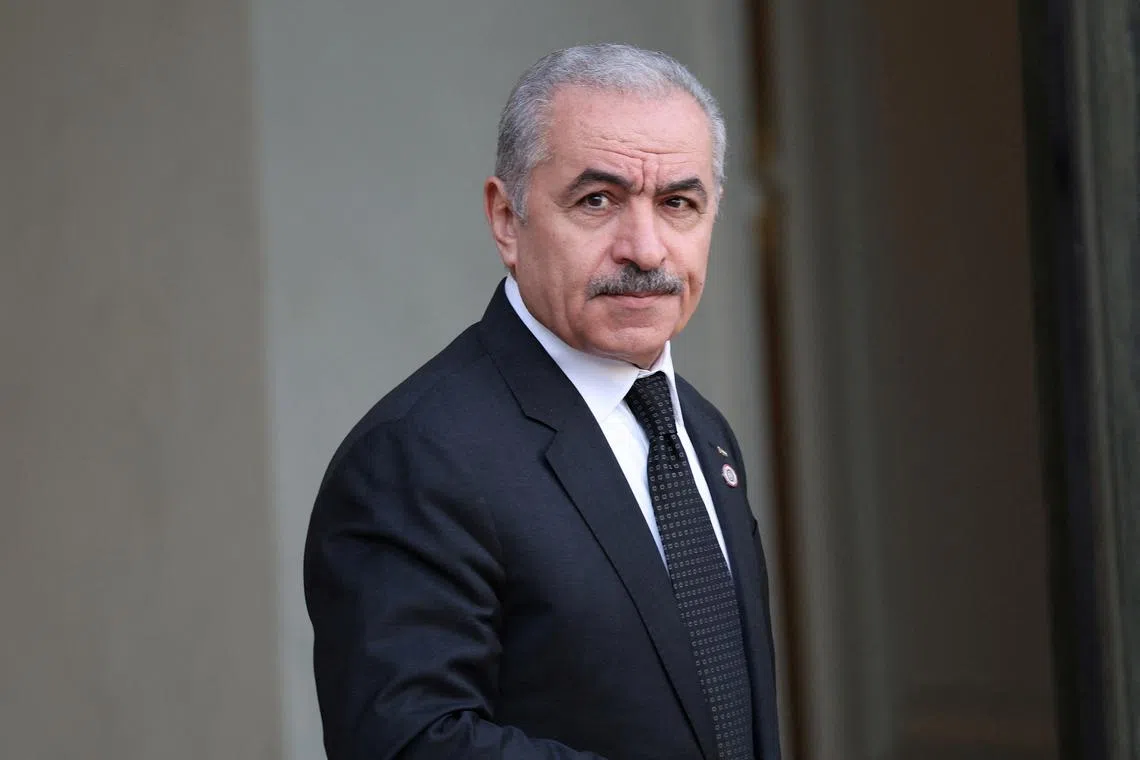Palestinian government submits resignation to President Abbas
Sign up now: Get ST's newsletters delivered to your inbox

Palestinian Prime Minister Mohammad Shtayyeh, who submitted his government's resignation, said “new political measures” are needed, given the changing reality in Gaza.
PHOTO: REUTERS
DUBAI - Palestinian Prime Minister Mohammad Shtayyeh on Feb 26 announced that his government, which rules parts of the occupied West Bank, has submitted its resignation.
He said new political measures are needed, given the changing reality in Gaza.
“I submit the government’s resignation to Mr President (Mahmoud Abbas),” Mr Shtayyeh said, adding that it comes in the wake of the “developments related to the aggression against the Gaza Strip and the escalation in the West Bank and Jerusalem”.
He said he had offered the resignation on Feb 20 but was formally submitting it in writing on Feb 26.
Mr Abbas has faced mounting anger since war erupted on Oct 7, between Israel and Palestinian group Hamas
Many have criticised the Palestinian President for not severely condemning the Israeli offensive there and the rising violence in the West Bank.
Since 2007, the Palestinian leadership has been divided between the Palestinian Authority of Mr Abbas, which exercises limited power in the West Bank, and Hamas, which rules Gaza.
The resignation of the government in the West Bank comes as several countries, including the United States, have called for a reformed Palestinian Authority that would take charge of all Palestinian territories after the war in Gaza ends.
“The next stage and its challenges require new governmental and political measures that take into account the new reality in the Gaza Strip,” Mr Shtayyeh said in a brief speech announcing the resignation.
He called for inter-Palestinian consensus and the “extension of the (Palestinian) Authority’s rule over the entire land of Palestine”.
The war in Gaza broke out after Hamas militants attacked southern Israel on Oct 7, resulting in the deaths of around 1,200 people, according to Israeli tallies.
Israel’s retaliatory military offensive has so far killed at least 29,700 people, according to the territory’s Health Ministry.
Violence in the West Bank has also flared since the war in Gaza erupted to levels unseen in nearly two decades.
Israeli troops and settlers have killed at least 400 Palestinians in the West Bank since the Gaza war began, according to the Health Ministry in Ramallah.
“The government was able to achieve a balance between meeting the needs of our people and providing services like infrastructure,” said Mr Shtayyeh, whose Cabinet took office in 2019.
“We will remain in confrontation with the occupation... and will continue to struggle to establish a state on the lands of Palestine,” he said.
It was still unclear whether Mr Abbas would accept the resignation immediately or wait until a new prime minister is appointed.
Palestinian media reports suggested Mr Abbas might appoint Mr Mohammed Mustafa, an executive committee member of the Palestine Liberation Organisation – dominated by the ruling Fatah movement – to head the new Cabinet.
Mr Mustafa has previously served as deputy prime minister and as a senior adviser to Mr Abbas on economic affairs.
Rafah
Mr Shtayyeh’s resignation also comes as Israel plans an invasion of the far southern Gaza city of Rafah.
Israel said on Feb 26 that its army had readied a plan to evacuate Gazans there ahead of the feared invasion.
This led the United Nations chief to warn that a ground attack would “put the final nail in the coffin” of its aid operations
UN Secretary-General Antonio Guterres said that Rafah – where 1.4 million Palestinians live in crowded shelters near the Egyptian border – is “the core of the humanitarian aid operation” in besieged Gaza.
Israeli Prime Minister Benjamin Netanyahu stressed on Feb 25 that, despite ongoing talks towards a ceasefire, the army will launch a ground invasion of Rafah to achieve “total victory” over Hamas.
He vowed that once land operations are launched there, an Israeli victory would be just “weeks away”.
He said any potential truce deal would only delay, not prevent, the operation.
On Feb 26, his office said in a brief statement that the military has presented the war Cabinet with a plan for evacuating the population from areas of fighting in the Gaza Strip, as well as the upcoming operational plan.
No details have been released on where the internally displaced people could go in Gaza, where vast areas have been destroyed.
Foreign governments and aid groups have issued dire warnings that a Rafah invasion would inflict mass civilian casualties.
Strikes in Lebanon
For the first time since the start of the Gaza war, at least two simultaneous Israeli strikes hit around Lebanon’s eastern city of Baalbek on Feb 26, two security sources told Reuters.
The Israeli military said it was “currently striking Hezbollah terror targets deep inside Lebanon” but provided no further details. There was no immediate comment from the Hezbollah armed group.
Hezbollah and the Israeli military have been exchanging fire along Lebanon’s southern border since October, when Hezbollah launched rockets at Israel in support of Hamas.
Israeli strikes had been mostly limited to the southern border region of Lebanon, although they have edged farther north in recent weeks.
The bombardment on Feb 26 represented a broadening of Israel’s offensive, a Lebanese security source said.
The Baalbek region, in Lebanon’s Bekaa Valley, is known to be a political stronghold of Hezbollah. It is also home to ancient Roman ruins and is an important agricultural and transport hub for Lebanon. Earlier on Feb 26, Hezbollah said it had shot down an Israeli Hermes 450 drone over Lebanese territory using a surface-to-air missile, the second time it has announced a downing of this type of unmanned aerial vehicle. AFP, REUTERS


